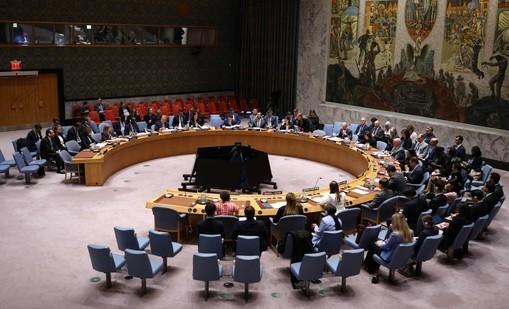
Was LeT involved? UNSC asks Pak on J&K attack, refuses to accept ‘false flag’ claim
The United Nations Security Council (UNSC) has sparked a fresh controversy in the ongoing political drama surrounding the recent attack on tourists in Pahalgam, Jammu and Kashmir. According to reports, during a closed-door meeting requested by Pakistan, UNSC members refused to accept Islamabad’s “false flag” narrative on the attack, and instead questioned whether the terrorist outfit Lashkar-e-Taiba (LeT) could be involved.
The meeting, which took place behind closed doors, was a significant development in the ongoing diplomatic spat between India and Pakistan over the Pahalgam attack. The UNSC’s refusal to accept Pakistan’s narrative has added fuel to the fire, with many speculating that Islamabad’s claims of a “false flag” operation are nothing more than a desperate attempt to divert attention from its own complicity in the attack.
For those who may not be aware, the Pahalgam attack occurred on October 1, when a group of terrorists ambushed a tourist bus, killing and injuring several people. The attack was widely condemned by the international community, with many countries calling for Pakistan to take immediate action against terrorist outfits operating from its soil.
Pakistan, however, has been quick to deny any involvement in the attack, instead blaming India for orchestrating a “false flag” operation to tarnish its reputation. Islamabad has also claimed that the attack was a “revenge” strike carried out by Kashmiri separatists against Indian forces.
But UNSC members have not been convinced by Pakistan’s narrative, and instead have demanded to know more about the role of Lashkar-e-Taiba (LeT) in the attack. LeT, a Pakistan-based terrorist outfit, has a long history of carrying out attacks in India, including the 2008 Mumbai attacks that killed over 160 people.
The UNSC’s questioning of Pakistan’s narrative has been seen as a significant development in the ongoing diplomatic standoff between India and Pakistan. Many experts have pointed out that Pakistan’s claims of a “false flag” operation are nothing more than a desperate attempt to deflect attention from its own failures to combat terrorism.
“The UNSC’s refusal to accept Pakistan’s narrative is a clear indication that the international community is not buying Islamabad’s claims of a ‘false flag’ operation,” said Ajai Shukla, a security analyst and former Indian Army officer. “Pakistan’s claims are nothing more than a desperate attempt to divert attention from its own complicity in the attack. The UNSC’s questioning of LeT’s involvement is a clear indication that the international community is willing to hold Pakistan accountable for its actions.”
The UNSC’s questioning of LeT’s involvement has also raised questions about the outfit’s ability to carry out attacks in India. LeT, which is widely considered to be a terrorist outfit by many countries, has a long history of carrying out attacks in India, including the 2008 Mumbai attacks that killed over 160 people.
The outfit’s ability to carry out attacks in India has been attributed to its strong links with the Pakistani military and intelligence agencies. Many experts have pointed out that LeT’s ability to carry out attacks in India is a direct result of Pakistan’s failure to combat terrorism.
“Pakistan’s failure to combat terrorism is a major concern for the international community,” said Ashok Kumar, a security analyst and former Indian Police Service officer. “The UNSC’s questioning of LeT’s involvement in the Pahalgam attack is a clear indication that the international community is willing to hold Pakistan accountable for its actions. Pakistan’s claims of a ‘false flag’ operation are nothing more than a desperate attempt to deflect attention from its own complicity in the attack.”
The UNSC’s questioning of LeT’s involvement has also raised questions about the targeting of tourists on the basis of religion. The Pahalgam attack, which killed and injured several tourists, has been widely condemned by the international community. Many experts have pointed out that the attack was carried out on the basis of religion, with the terrorists specifically targeting Hindu and Sikh tourists.
“The UNSC’s questioning of LeT’s involvement in the Pahalgam attack has raised serious concerns about the targeting of tourists on the basis of religion,” said Vivek Katju, a former Indian Foreign Service officer. “The attack was carried out on the basis of religion, and the UNSC’s questioning of LeT’s involvement is a clear indication that the international community is willing to hold Pakistan accountable for its actions. Pakistan’s claims of a ‘false flag’ operation are nothing more than a desperate attempt to deflect attention from its own complicity in the attack.”
In conclusion, the UNSC’s questioning of Pakistan’s narrative on the Pahalgam attack and its refusal to accept Islamabad’s “false flag” claims has sparked a fresh controversy in the ongoing diplomatic standoff between India and Pakistan. The UNSC’s questioning of LeT’s involvement in the attack has raised serious concerns about the outfit’s ability to carry out attacks in India, and its links with the Pakistani military and intelligence agencies.
The UNSC’s refusal to accept Pakistan’s narrative has also raised questions about the targeting of tourists on the basis of religion, and the need for Pakistan to take immediate action against terrorist outfits operating from its soil. The international community must remain vigilant and continue to hold Pakistan accountable for its actions, and work towards a peaceful and stable region.



